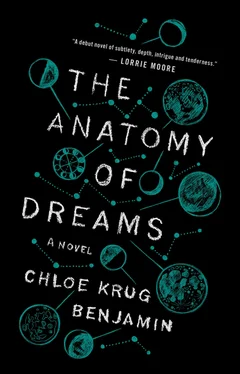Gabe and I began to sit together in class, scribbling notes on old homework assignments whenever the teacher turned to the board. He saved a chair for me at lunch, his beaten-down black JanSport marking my spot. I still remember how it felt to walk into the dining hall and see it there. My stomach rose, as if pulled by strings; I moved not by foot but by hovercraft. Most surprising was how little I resisted. Some of my friends had boyfriends, and I’d always scoffed at how distracted they became, how easily they relinquished their former selves—and here I was, vaulting away, leaving behind the tidy rows of my independence.
It took us weeks to figure out how to sneak into each other’s rooms at night without the resident advisers catching on. The trick was to go between hall checks, walking nonchalantly past the monitor’s station as though you were just going to pee, then taking the fire escape to ground level. The boys’ dorm was separated from the girls’ by a thin path, but if you snuck around the back of the buildings, James Bond style, you could avoid the Cyclops gaze of the security camera. Those first few nights were deliciously illicit; we clung to each other even more fiercely for having made the trip successfully. But one morning, I woke to find that Gabe was gone. That time, I chalked it up to the discomfort of fitting two people in one pancake-mattressed twin bunk. But when it happened a second time, and then a third, I was hurt.
“Different people like it different ways,” said Hannah, who was not bothered by Gabe’s presence at night. She slept so deeply that our friends had started to call her Hannah Van Winkle; the only thing that woke her up was our CD alarm clock, blasting Stevie Wonder’s “Signed, Sealed, Delivered” at full volume. “Could be he’s trying to send you a subliminal message, say he doesn’t really want to have sleepovers after all.”
Hannah was the baby in a bright lineup of sisters—sisters who knew how to braid hair, who flattened cardboard boxes and slid down the hills that surrounded their father’s farm, and who handed down to Hannah a complicated mythology about boys in addition to old sweaters and winter jackets and bicycles. But Gabe didn’t seem the type for subliminal messages. His face was open and readable as a dog’s. When we talked, I could tell if I’d offended or pleased him just by the tightness of his mouth.
One Tuesday in November, I saw him leaving Mr. Keller’s garden. I had woken up at four thirty and hadn’t been able to fall back asleep, so I pulled my pillow over to the window that overlooked the grounds and began to read with a flashlight. Soon I caught some motion in the corner of my eye, and when I looked outside, I saw it was Gabe. My dorm faced the front of Keller’s house, but Gabe appeared to be coming from the back, where the garden was.
My first thought was that he was still stuck on Mr. Keller’s flowers, and a wad of dread gathered in my chest. Neither one of us had mentioned the doubled flower since the night of the eclipse. I was embarrassed for him—his interest in it, his suspicions about the school as a whole, made him seem paranoid. So when I saw him in the dining hall that morning, I meant to bring it up. But his skin was pale and his eyes were sunken, the lower lids rimmed by sallow half-moons. It frightened me—I wondered if something much worse was going on. I made him a plate of food, and we ate together by the windows that overlooked Observatory Hill, where we had watched the eclipse almost one year before. By the end of the meal he seemed to perk up, the color of his cheeks becoming more beige than white, and for the moment, that satisfied me.
2. MADISON, WISCONSIN, 2004
Six years later, as Gabe and I drove a U-Haul from Fort Bragg, California, to Madison, Wisconsin, I found myself sorting obsessively through my memories of Mills and the years after I left. There was plenty of time on our drive, and more space: first the California redwoods, then the sliced-open rock of the Sierra Nevada and Utah’s red hills. In Colorado we saw rivers so glassy and clear they mirrored the land above them, so that the river ceased to be a river at all and instead became a double of the sky.
We looked at all this without talking; we felt as though it belonged not to us but to the natives and travelers who hiked those canyons by day and slept with the sun. We had forfeited our right to day by accepting a different offer. And though I had accepted it, I had always been the harder sell, and there were still moments when insurgencies would spark unexpectedly inside me. It was as though there were thousands of little soldiers in my gut, most of whom were aligned with the cause but some who wrestled free and fired at it. It was one thing to say we would participate in Keller’s work; it was another to make it our lives. Or perhaps I clung to that skepticism because it suggested that choice had not been lost—or at least, irreversibly muddied—at the very start.
Our new house in Madison was a rental on East Main Street, in a neighborhood called Atwood. It was a historically blue-collar district that had undergone a sort of half gentrification: the old porn house had been converted into a theater that showed art films, and there was a little chocolatier between Trinity Lutheran Church and St. Bernard Catholic Church. But there were also wide lots penned in by wire and filled with low warehouses, or nothing at all. Madison is known for the two lakes that bracket its isthmus, and Atwood felt like an island, hemmed in by bodies of water.
The house was square, painted a faded, wheaty yellow, with a steeply triangular roof; the previous tenants had left a couch on the front porch. The house’s combination of shabbiness and sweetness was typical of Madison. Unless you went to the west side, where the university professors lived, or to Maple Bluff, the governor’s neighborhood, most of the apartments looked a little cobwebby. Inside our place, the wooden floors were faded and the kitchen drawers jammed. The refrigerator door routinely got suctioned stuck, opening only when I braced one foot against the freezer and yanked with all of my strength. The brass doorknocker had rusted to the color of tea, and the light fixtures—beautiful fixtures, made of decorative metal and glass—swung precariously on their cords.
In Fort Bragg, we had lived in a garden apartment—half underground, that is—that Keller paid for, subtracting it out of what he owed us for our work. Our place in Madison was huge in comparison. Upstairs was the bedroom, the bathroom, and, above that, an attic. On the bottom level were the living room, the kitchen, and the office. Gabe preferred to work on campus, so the office became mine: a room with large windows and a domed ceiling. I loved the clarity of its shape, the sense of being tucked away in an egg, and when I left it in the evenings, dazed from work, I felt like a hatchling, vulnerable and disoriented.
There was one other house on our block, separated by our two driveways and patchy lawns. Structurally, it was almost identical to ours, but it had been painted violet with pink trim. The porch was strung with multicolored lights and hung with wind chimes I could hear from the office. And for most of August, that noise, along with the two recliners on the porch, was the only evidence that people actually lived there. Most of the bright, floral drapes were drawn, but the curtains on the upstairs window had fluttered open, and I could see the edge of a bedside table, a salmon-colored pillow.
I was eager for the sight of other people because our house was so secluded. It sat in the center of a nearly barren block: to the right was the neighbor’s house, and to the left were freight-train tracks, which were clearly the reason for our affordable rent. We were separated from the tracks by a chain-link fence, four feet high and overrun with wild greenery: messy, verdant trees keeled over them from each side. The trains came most often after dark, making low bellowing noises that kept us awake. It was almost a blessing that so much of our work with Keller took place at night.
Читать дальше












